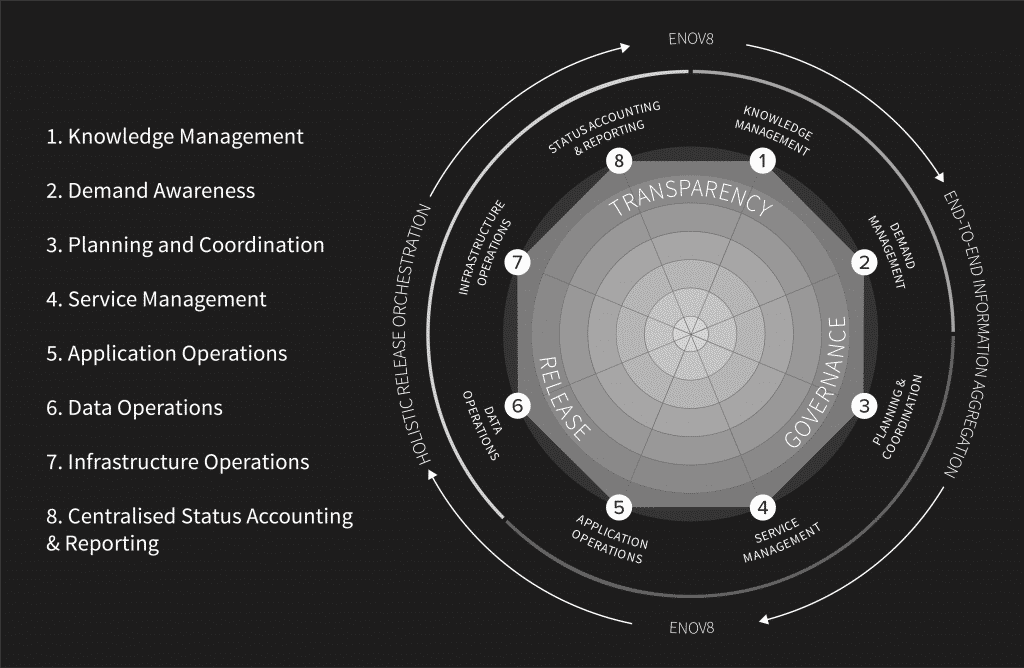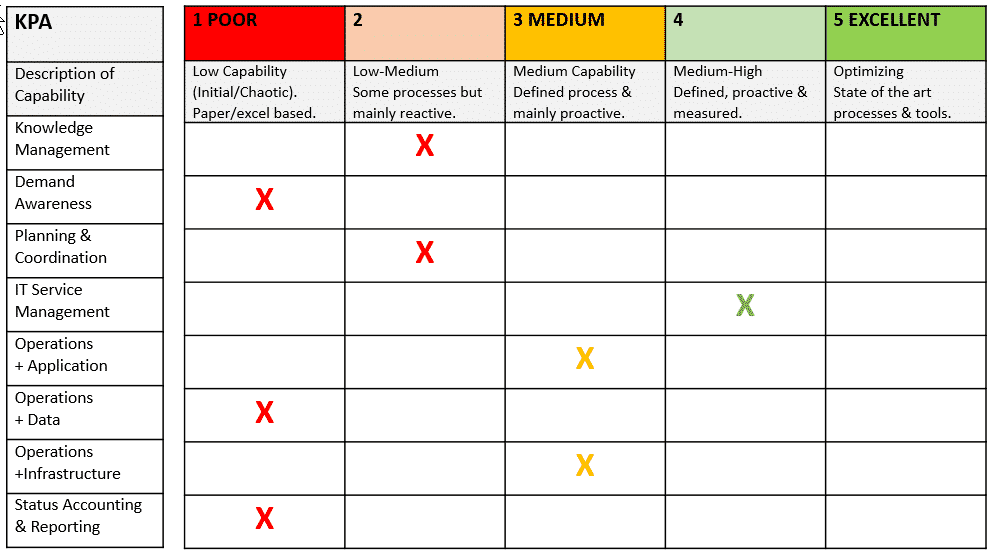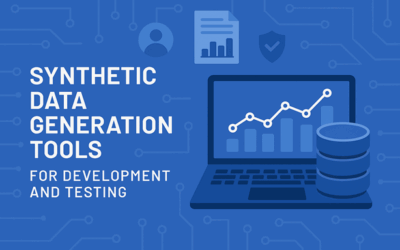Environment Management Maturity index Assessment – enov8
by Niall Crawford
Well here at Enov8, over the last few years, we have been building a model called the EMMi (the Environment Management Maturity Index)
Originally called the TEMMi , the EMMi is designed to help organisations understand the big picture, openly discuss capabilities using a standard “frame of reference” and quickly assess themselves i.e. Identify Strengths, Weaknesses, Opportunities and Threats.
The EMMi (Environment Management Maturity Index) can be broken into following eight Key Performance Areas:

(Find the PDF here)
So how do you rate?
Follow the methodology below & use the online maturity calculator to generate yourself a spider diagram baseline report.
EMMi – Score Card
Consider each of the eight Key Performance Area (KPA) from a People (skilling), Process (Repeatability) & Product (Tooling perspective) and score yourself from 1-5.

1. Environment Knowledge Management:
Understanding your IT environments across the lifecycle i.e. across Projects Delivery (e.g. Development, Test, Training) & Production. Without effective intelligence, you will struggle to manage your environments effectively. Intelligence mapping is both top down & bottom up i.e. Top down included understanding Businesses Units, Business Processes, Systems relationships, while Bottom up looks at from the other direction i.e. Components, Interfaces & Instances. Score yourself:

2. Environment Demand Awareness
There is a reason you have these environments, they’re called your consumers (Project Teams, DevTest Teams etc). The ability to understand demand and current usage of one’s IT Environments and shift planning & coordination left. Score yourself:

3. Environment Planning & Coordination
The proactive planning & coordination of environment events & deployments ensures your systems are provided in a timely fashion and ems are correctly configured i.e. fit for purpose and available. Score yourself:

4. Environment IT Service Management
IT Service Management is a customer-focused approach to delivering & supporting information technology. Key aspects of ITSM support include management of Incidents, Change and Releases. ITSM, although potentially leaner, is relevant even in Non-Production as it controls the chaos, invisible change and avoids disruption. Score yourself:

5. Application Release Operations
The implementation of consistent, repeatable & traceable application release operations contributes to the broader needs of IT Environment Management and IT delivery. At a minimum, you should be promoting standard operating procedures & ideally tracking these & automating the most time-consuming tasks. Score yourself:

6. Data Release & Privacy Operations
The implementation of consistent, repeatable & traceable data release operations contributes to the broader needs of IT Environment Management and IT delivery. At a minimum, you should be promoting standard operating procedures & ideally tracking these & automating the most time-consuming tasks. Score yourself:

7. Infrastructure & Cloud Release Operations
The implementation of consistent, repeatable & traceable infrastructure & cloud release operations contributes to the broader needs of IT Environment Management and IT delivery. At a minimum, you should be promoting standard operating procedures & ideally tracking these & automating the most time-consuming tasks. Score yourself:

8. Status Accounting & Reporting:
The ability to capture and present “real-time” environment information in a way that will uplift IT environment analytics, decision making and continual optimization. At any point in time you should be able to visualise Environment Topology, Usage, Health, Activities, Operational Behaviour and System Team Competence. Score yourself:

Want to learn more about how to improve each of the Environment dimensions?
If you are interested in learning more about implementing a mature Environment Management framework in your organisations then speak to enov8 about enov8 Environment Manager. Enov8 Environment Manager is the only complete platform that takes you across the Environment Management & Release Spectrum.
Niall is the Co-Founder and CIO of Enov8. He has 25 years of experience working across the IT industry from Software Engineering, Architecture, IT & Test Environment Management and Executive Leadership. Niall has worked with, and advised, many global organisations covering verticals like Banking, Defence, Telecom and Information Technology Services.
Relevant Articles
7 Synthetic Data Generation Tools for Dev & Testing
In software development and testing, having access to high-quality, realistic data is crucial. But real production data is often sensitive, regulated, or simply unavailable for testing purposes. Synthetic data generation tools provide a powerful alternative, enabling...
The SAFe Hierarchy and Levels, Explained in Depth
The Scaled Agile Framework (SAFe) is a comprehensive set of principles and practices designed to help organizations adopt agile methods on an enterprise level. It provides a set of guidelines and best practices that enable large-scale product development with agility....
DORA Compliance – Why Data Resilience is the New Digital Battlefield
How Enov8 Helps Financial Institutions Align with the EU's Digital Operational Resilience Act Executive Introduction As of January 2025, the EU's Digital Operational Resilience Act (DORA) has become legally binding for financial institutions operating across the...
Data Fabric vs Data Mesh: Understanding the Differences
When evaluating modern data architecture strategies, two terms often come up: data fabric and data mesh. Both promise to help enterprises manage complex data environments more effectively, but they approach the problem in fundamentally different ways. So what’s...
What Is Release Management in ITIL? Guide and Best Practices
Managing enterprise software production at scale is no easy task. This is especially true in today’s complex and distributed environment where teams are spread out across multiple geographical areas. To maintain control over so many moving parts, IT leaders need to...
Test Environment: What It Is and Why You Need It
Software development is a complex process that requires meticulous attention to detail to ensure that the final product is reliable and of high quality. One of the most critical aspects of this process is testing, and having a dedicated test environment is essential...






